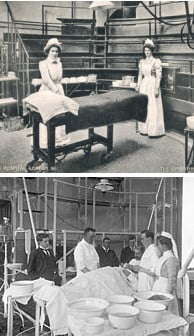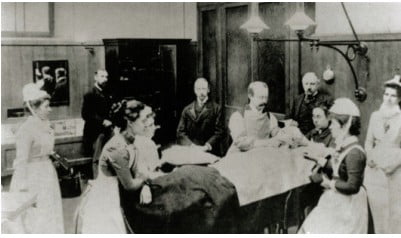One of the better moves CY Leung has made since becoming Hong Kong’s Chief Executive is to abandon his predecessor Donald Tsang’s harebrained scheme to turn the city into some sort of health-care hub. Inevitably, Sir Bow-Tie’s dream involved real estate: sell land cheaply-but-not-too-cheaply to private hospital operators who would then attract high-paying foreigners and treat some lower-paying local people on the side. It would boost the Big Lychee’s services exports, and some of our middle class would migrate away from overburdened public medical facilities. But balancing the interests of all the ‘stakeholders’ proved impossible (the cost of building a hospital: at least US$1 million per bed).
 Meanwhile, demand for public hospital services outstrips supply. A bigger budget – easily affordable given the government’s fiscal position – is one obvious solution. But bureaucrats and others who worry about the aging (owing to being healthier) population resist that idea, and insist that the middle class pay more. Even middle-class people feel embarrassed and even a bit guilty at getting public hospital treatment virtually for free. Hence the announcement a few weeks ago that two of Donald’s sites would be dedicated to affordable private hospitals for the genteel non-millionaire segment. To lure the bourgeois patients away from the all-but-free public service, these new hospitals will (say) offer shorter waiting times, with warmer congee in the morning and a free newspaper.
Meanwhile, demand for public hospital services outstrips supply. A bigger budget – easily affordable given the government’s fiscal position – is one obvious solution. But bureaucrats and others who worry about the aging (owing to being healthier) population resist that idea, and insist that the middle class pay more. Even middle-class people feel embarrassed and even a bit guilty at getting public hospital treatment virtually for free. Hence the announcement a few weeks ago that two of Donald’s sites would be dedicated to affordable private hospitals for the genteel non-millionaire segment. To lure the bourgeois patients away from the all-but-free public service, these new hospitals will (say) offer shorter waiting times, with warmer congee in the morning and a free newspaper.
A snag. A few people might pay, say, HK$750 a day rather than HK$100 for quicker treatment. But the Hong Kong population’s refugee mentality lives on, and for many the idea of spending more when you can get for less is tough to accept. Saving HK$650 and waiting 10 more weeks is second nature. The government’s solution is insurance. But this is still a hard sell alongside the virtually free public-sector alternative. At least one insurer started to offer ‘middle class’ health insurance a couple of years back, with attractive packages (pretty fair coverage for 40-somethings at HK$15,000 a year), and there were no takers. So the government will have to offer a tax break – also known as a subsidy – to suit Hong Kong’s zero-sum financial psychology. In exchange for giving up something cheap (public hospital care), you will get a different but exciting bargain-discount-bonus-no extra charge deal; it might help to get Louis Vuitton or someone to do the marketing, so it becomes something you brag about.
Assume that capacity expands in line with resources, say through importation of overseas nurses, etc. Will the private sector play along and provide ‘affordable’ care? At the moment, apart from primary-care providers in poorer neighbourhoods, private health services have little hope of competing against the public sector, so they focus on the opposite end of the spectrum and aim to maximize revenues from the highly insured and rich. Not all private providers are scumbags, but at least some perform unnecessary operations to stuff their wallets. Would these guys be interested in the patients at ‘middle-class’ hospitals, with their government-scrutinized insurance cover and caps on fees? It’s like expecting property developers to voluntarily build apartments for Hongkongers rather than Mainlanders.
Ultimately, it would probably make more sense for the government simply to set up a second tier of somewhat-less-subsidized-but-somewhat-better public hospital service. Something like the Home Ownership Scheme in housing. That way, at least you get some more resources coming into the system without the government paying every extra penny. Or just fund the public hospitals properly and be done with it. (Or make it illegal to perform unnecessary operations?)


We need more hubs.
We need a pet cemetery hub for example.
I’m researching into Staunton Street.
It will be called FLUFFY PAWS at ENOTECA.
Any more hub suggestions?
I could never figure out why John Tsang just couldn’t give a part of that surplus to the Hospital Authority to help alleviate wait-times, and hire more staff to help the over-burdened nurses. But, that would require thinking and creativity; attributes lacking in civil servants the world over.
I also like Michael Chugani’s summation of HK in today’s paper:
Landowner sums it up: money is all that matters
Let’s applaud Hau Chi-keung. Who? Never mind, but in a few succinct words he defined Hong Kong’s true core value – money. Hau is a big-time New Territories landowner. He was on television news over the weekend with his dark glasses and hat. At first Public Eye thought it was a set for a gangster movie. As a landowner who stands to make big bucks from the government’s plan to build new border towns, Hau was castigating project opponents on screen. “It is my right to sell everything – even my ancestors’ temple – if there is a good price,” he declared. That sums up Hong Kong’s cardinal rule – nothing is impossible if the price is right. Desecrating ancestral homes, demolishing heritage buildings, tycoons duping homebuyers by inflating floor sizes, profiteers snapping up iPhones to resell, rip-off taxi drivers, the MTR putting profits above people … the list goes on. Money over morals. There is no better way to define us. We thank Hau for telling it like it is.
Burying your granny is indeed another, highly effective way of taking possession of a piece of land: no permission needed, there’ll be a new amnesty coming along soon. Just choose the spot carefully to stop all development within a radius of 100 yards. And you can always sell her if the price is right.
Since our government is itching to manage all areas of life, I would have thought that a properly funded freeish health service was an obvious choice. If they devoted half the resources per capita that the Americans spent on health, that would future-proof the system — they might even have some left over to train more nurses and/or import a few overseas ones.
HK can’t live indefinitely off reclamation, “logistics” and money laundering: without any real industrial sector, services are all we have. But nobody in their right mind would voluntarily join the educational sector; and tourism is biased away from our cultural, heritage or even nature assets, and so is suffocating itself. I’m not sure what that leaves…
@PropertyDeveloper
Our glorious future as an RMB clearing house?
London was recently celebrating it’s new RMB hub status, despite essentially having to clear everything through HK anyway and being limited by a trade settlement scheme that balances on the somewhat small amount of business that the UK actually does with china. Clearly if it’s good enough for George Osborne to get excited about we should be dancing a merry jig!
“Rip-off taxi drivers”? Ok, once in a while clipping the extra dollar on rounding, but that is more like convenience than thievery. In more than 20 years, I’d say fewer “rip-off” taxi drivers than I could count on one hand, and still use chopsticks.
PCCW, I second that. Ive been ripped off more in Singapore than HK. A few words of Cantonese in terms of your destination and route and they are great. Oh and they appreciate tips.
Chugani is probably referring to the taxi drivers who drive away with mainlanders designer goodies while adding insult to injury with an over the odds flat fee.
Although, given how much Chugani complains about mainland tourists he should be lauding these drivers far and wide.
Another good post from Hemmers.
The Gods have a sense of justice, ken? HK sucks up a supply-demand imbalance with health care that favours the wee man. Only fair given the supply-demand imbalance with property that favours the Big Man.
Healthcare is like university education – consumed by one group (patients/insurers) and (largely) paid for by another group (insurers/patients). This leads to providers rolling out more services (which the consumer desires) but does not have to pay for – and thus rising costs.
The only way to reduce the rate of inflation is to give the consumer some incentive to reduce consumption. The Singaporeans have done this quite well, but they are unusual.
I support tax breaks for people who are willing to pay privately for things they could get virtually free from the state – private health insurance and education are two good examples.
The Tsang government wanted to introduce mandatory health insurance – makes a lot of sense – the public sector is quite inefficient and would benefit from market discipline – but the public will not accept anything mandatory because the MPF is such a ripoff.
Tsang dud not have the political will to fix the MPF, so any health insurance scheme will be voluntary, and plagued by adverse selection (ie the sick buy in, the healthy stay out).
The scrapping of the health hub didn’t make any difference, because nothing was ever implemented, but it is a pity – healthcare is a volume business, and, by catering to the region providers would improve standards, making better services available to all – as in the USA.
The unseen problem in HK healthcare is not overservicing
Dr Jason continues ….
It is under servicing ie doctors being unable or unwilling to do the needful (obviously, usually, the difficult stuff).
Medicine is a credence profession, like plumbing and taxi driving – the service provider recommends the service and then provides it.
The best way to avoid over servicing is to go to a busy provider. The best way to avoid under servicing is to go to a super specialist who actually knows how to treat your condition.
Unfortunately super specialists only appear in large efficient markets with free flow of information (eg USA) not small inefficient markets with restrictions on flow of information (HK doctors not allowed to advertise).
Did CY scrap the healthcare hub? Or has he just not mentioned it? I know he made an unimplementable election promise not to let mainlanders give birth in HK hospitals, but that was just hot air.
Health Chief Ko Wing Man announced ‘no hub’ 2 or 3 weeks ago – there was no public outcry…..